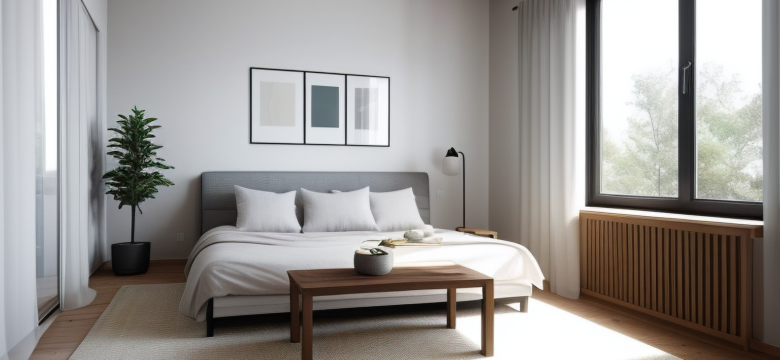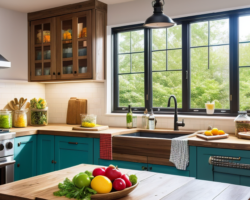Have you ever felt overwhelmed by the sheer amount of stuff in your life? The clutter, the chaos, and the constant need to manage it all can be exhausting. Minimalism offers a refreshing escape from this whirlwind, inviting you to embrace a lifestyle that prioritises quality over quantity. Imagine walking into a serene space, free from distractions, where each item has a purpose and brings you joy. That’s the essence of minimalism!
At its core, minimalism is about making intentional choices that reflect your values and aspirations. It’s not merely about getting rid of things; it’s a mindset that encourages you to focus on what truly matters. By adopting this philosophy, you can transform your living space into a sanctuary of peace and clarity. Think of it as a breath of fresh air in a stuffy room—suddenly, everything feels lighter and more manageable.
The journey to minimalism begins with a single step: decluttering. This process isn’t just about tossing items away; it’s an opportunity to reflect on your life and the things that genuinely enhance it. As you embark on this journey, you’ll likely discover that living with less not only simplifies your environment but also enriches your life in unexpected ways.
The Philosophy of Minimalism
At its core, minimalism is about embracing a lifestyle that prioritises quality over quantity. It’s not merely about getting rid of stuff; it’s about creating space for what truly matters in life. Imagine walking into a room filled with only the things you love and need—how refreshing would that be? This philosophy encourages individuals to reflect on their possessions and ask, “Does this add value to my life?” By focusing on intentional living, minimalism helps cultivate a mindset that appreciates simplicity and clarity.
Minimalism promotes a deeper understanding of our desires and needs. It invites us to shift our focus from accumulating things to nurturing experiences and relationships. Instead of chasing after the latest trends or gadgets, minimalists often find joy in the little things—like a quiet evening with a good book or a walk in nature. This shift in perspective can lead to a more fulfilling existence, where every item and experience is cherished rather than taken for granted.
In essence, minimalism is about creating a life that resonates with your true self. It challenges societal norms that equate happiness with material wealth and encourages a more meaningful existence. As you delve into the minimalist philosophy, consider the following principles:
- Clarity: Clear your space, clear your mind.
- Intentionality: Make conscious choices about what you bring into your life.
- Connection: Focus on fostering relationships that enrich your life.
By embracing these principles, you’ll find that living with less can lead to a life filled with more—more joy, more clarity, and more purpose.
Benefits of a Minimalist Lifestyle
Embracing a minimalist lifestyle can be a game-changer, transforming not just your living space but your entire outlook on life. Imagine waking up each day in a home that feels calm and inviting, free from the chaos of clutter. The benefits of minimalism extend far beyond aesthetics; they touch on your mental, emotional, and even financial well-being.
One of the most significant advantages is the reduction of stress. When you surround yourself with fewer possessions, you eliminate distractions, allowing you to focus on what truly matters. This clarity can lead to enhanced productivity and creativity. In fact, studies have shown that a decluttered environment can improve focus by up to 50%.
Additionally, minimalism promotes financial health. By prioritising quality over quantity, you make intentional purchasing decisions that align with your values. This not only saves you money but also reduces buyer’s remorse, leading to a more satisfying financial life. Consider the following:
- Less spending on unnecessary items
- More savings for experiences that enrich your life
- Reduced maintenance costs for fewer possessions
Ultimately, adopting a minimalist lifestyle leads to a more fulfilling and intentional life, where every item you own and every moment you spend holds meaning. So why not take the plunge? After all, living well with less could be the secret to unlocking a happier you!
Decluttering Your Space
Decluttering your space is not just about tossing out old junk; it’s a transformative journey that can breathe new life into your home and mind. Imagine walking into a room where every item has a purpose, and every corner radiates peace. Sounds dreamy, right? To get there, you need to start by assessing your belongings. Take a moment to reflect on what truly adds value to your life. Ask yourself, “Do I use this? Does it spark joy?” If the answer is no, it’s time to say goodbye.
Begin your decluttering adventure by tackling one area at a time. This could be a single drawer, a closet, or even your entire living room. The key is to avoid overwhelm; focus on small victories. You might find it helpful to create a three-box system: one for items to keep, one for donations, and another for trash. This method not only simplifies the process but also gives you a clear visual of your progress.
Once you’ve decluttered, maintaining this newfound serenity is crucial. Establish a regular routine to review your space and remove any items that no longer serve you. Remember, minimalism is a lifestyle, not a one-time event. By committing to this practice, you’ll cultivate an environment that fosters clarity and creativity, allowing you to focus on what truly matters in life.
Creating a Decluttering Plan
Creating a decluttering plan is like crafting a roadmap to a more peaceful and intentional life. It’s essential to approach this journey with purpose and clarity. Start by setting aside some time to reflect on your current living space. Ask yourself: what do I truly need? What brings me joy? This self-inquiry will guide you in making decisions that resonate with your values.
Next, break down the decluttering process into manageable steps. Instead of overwhelming yourself with the entire house, consider tackling one room or area at a time. For instance, you might begin with your bedroom, where you can create a serene sanctuary. As you go through your items, use the Four-Box Method:
- Keep: Items that are essential or bring joy.
- Donate: Things in good condition that you no longer use.
- Sell: Valuable items that could benefit others.
- Trash: Broken or unusable items.
By categorising your belongings, you’ll not only declutter but also gain insights into your consumption habits. Remember, it’s not just about getting rid of things; it’s about creating a space that reflects who you are. Once you’ve decluttered, maintain your progress by establishing a weekly review where you assess new items entering your home. This way, you can ensure that your space remains a sanctuary of simplicity and joy.
Maintaining a Clutter-Free Lifestyle
Once you’ve embarked on your decluttering journey, the real challenge begins: maintaining that glorious clutter-free state. Think of it like tending to a garden; if you neglect it, weeds will sprout up before you know it! To keep your space serene and organised, it’s essential to cultivate good habits that prevent clutter from creeping back in.
Start by establishing a daily routine. Set aside a few minutes each day to assess your space. Ask yourself: “Do I really need this?” If the answer is no, let it go! Implement a one-in, one-out policy; for every new item you bring home, consider parting with something else. This simple practice can significantly reduce accumulation.
Moreover, creating designated spaces for your belongings can work wonders. When everything has its place, it’s easier to keep things tidy. Consider using storage solutions that suit your style, making organisation feel less like a chore and more like a personal expression.
Lastly, don’t underestimate the power of mindfulness. Regularly reflect on your possessions and their significance in your life. Are they serving a purpose, or are they just taking up space? By staying mindful, you’ll cultivate a lifestyle that not only embraces minimalism but celebrates it, ensuring your home remains a peaceful haven.
Mindful Consumption
In a world overflowing with choices, emerges as a beacon of clarity. It’s about being intentional with what you buy, ensuring each purchase resonates with your values and enhances your life. Imagine walking through a store and instead of grabbing the latest gadget or trend, you pause and ask yourself, “Does this truly add value to my life?” This simple question can transform your shopping habits and lead to a more fulfilling lifestyle.
Mindful consumption isn’t just about cutting back; it’s about quality over quantity. By focusing on items that are durable, sustainable, and meaningful, you create a home filled with treasures rather than clutter. For instance, consider investing in a few high-quality pieces of clothing instead of a wardrobe bursting with fast fashion. This approach not only saves money in the long run but also reduces waste, benefiting the planet.
To embrace mindful consumption, consider these practical tips:
- Evaluate Needs vs. Wants: Before making a purchase, reflect on whether it’s a necessity or just a fleeting desire.
- Research Products: Look into the brands you support. Do they align with your values? Are they environmentally friendly?
- Practice Gratitude: Cultivating a sense of gratitude for what you already own can reduce the urge to acquire more.
By adopting mindful consumption practices, you not only enrich your own life but also contribute positively to the community and environment. It’s a ripple effect where every conscious choice leads to a more sustainable and intentional way of living.
Building Meaningful Relationships
Minimalism isn’t just about decluttering your home; it also extends into our social lives. Imagine your relationships as your personal garden. Just as you wouldn’t want weeds choking your beautiful flowers, you shouldn’t allow superficial connections to drain your energy. Embracing a minimalist mindset means prioritising quality over quantity in your relationships. This approach encourages you to focus on nurturing those connections that truly matter, fostering deeper bonds with the people who enrich your life.
So, how do you cultivate these meaningful relationships? Start by being intentional with your time. Instead of spreading yourself thin across numerous acquaintances, dedicate your energy to a few close friends and family members. This can lead to more fulfilling interactions, where you can share experiences that resonate on a deeper level. Consider the following practices to enhance your connections:
- Prioritise quality time: Create opportunities for shared experiences, whether it’s a simple coffee catch-up or a weekend getaway.
- Engage in meaningful conversations: Ask open-ended questions that encourage deeper discussions, allowing you to understand each other better.
- Show appreciation: Regularly express gratitude for the people in your life, reinforcing the bonds you share.
Moreover, setting boundaries is essential in maintaining these relationships. Just like you wouldn’t let a garden become overgrown, you need to protect your time and energy. Communicate your needs clearly, ensuring that you create space for relationships that uplift you while gently letting go of those that don’t serve your well-being. By doing so, you can cultivate a life surrounded by positivity and support.
Prioritising Quality Time
In our fast-paced world, it’s all too easy to let quality time slip through our fingers like sand. We often find ourselves caught up in the whirlwind of daily tasks, scrolling through social media, or juggling endless commitments. But what if we paused for a moment and reflected on what truly matters? Prioritising quality time with loved ones can transform our relationships and enrich our lives in ways we never imagined.
Imagine this: instead of a quick coffee with a friend where you barely exchange a few words, you could organise a heartfelt dinner where laughter and stories flow freely. This not only strengthens bonds but also creates memories that last a lifetime. Here are a few tips to help you focus on quality time:
- Schedule it: Just like you would an important meeting, block out time in your calendar for loved ones.
- Be present: Put away distractions like phones and focus on the moment.
- Engage in activities: Choose shared hobbies or experiences that allow for deeper conversations.
By embracing these practices, you’ll not only nurture your relationships but also cultivate a sense of fulfilment that comes from being genuinely connected. Remember, it’s not about the quantity of time spent together, but the quality of those moments that truly counts. So, let’s make a conscious effort to cherish these connections and watch our lives blossom!
Setting Boundaries
In the whirlwind of life, setting boundaries is like creating a protective fence around your garden of well-being. Without these fences, weeds of negativity can creep in, choking out the vibrant blooms of your relationships. But how do you go about establishing these essential limits? It all starts with clear communication. You need to express your needs and desires openly, ensuring that others understand your boundaries. Think of it as drawing a line in the sand—one that you are not afraid to defend.
Moreover, it’s crucial to recognise that boundaries are not just about saying “no.” They are about prioritising what truly matters to you. When you set boundaries, you create space for deeper connections with those who enrich your life. To illustrate this point, consider the following:
- Identify Your Values: Reflect on what is essential to you. This will guide your boundary-setting process.
- Communicate Clearly: Use “I” statements to express your feelings and needs without sounding accusatory.
- Be Consistent: Once you establish boundaries, stick to them. This reinforces their importance.
Ultimately, setting boundaries is a form of self-care that empowers you to cultivate relationships that uplift and inspire you. So, take a deep breath, draw your lines, and watch as your connections flourish in the space you create!
Frequently Asked Questions
- What is minimalism?
Minimalism is a lifestyle choice that focuses on simplifying your life by reducing clutter and prioritising what truly matters. It encourages you to let go of excess possessions and distractions, allowing for a more intentional and fulfilling existence.
- How can I start my minimalist journey?
Begin by evaluating your belongings and identifying items that no longer serve a purpose. Create a decluttering plan, tackle one area at a time, and make a conscious effort to only acquire items that align with your values and needs.
- What are the benefits of living minimally?
Embracing minimalism can lead to reduced stress, improved focus, and better financial health. It allows you to cultivate meaningful relationships and spend more time on experiences that enrich your life, rather than on material possessions.
- How do I maintain a clutter-free lifestyle?
To keep your space clutter-free, establish habits such as regular decluttering sessions and mindful consumption. Set boundaries on new purchases and continually assess your belongings to ensure they still align with your minimalist values.





